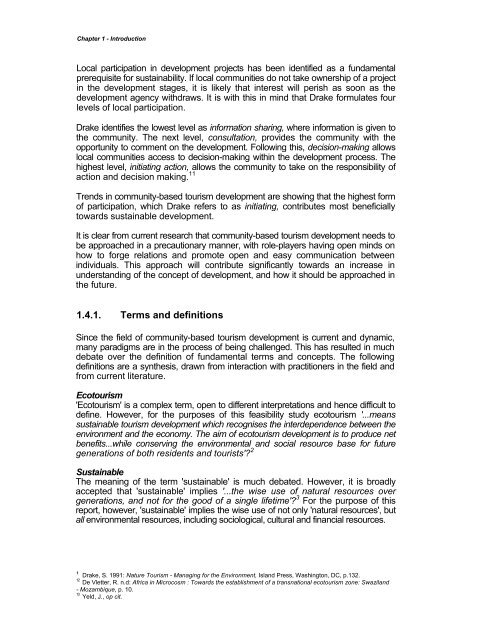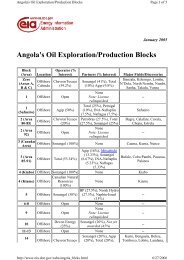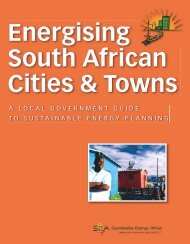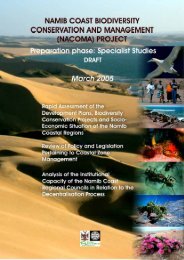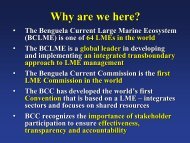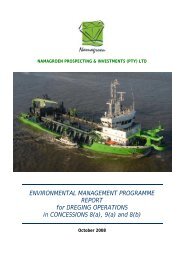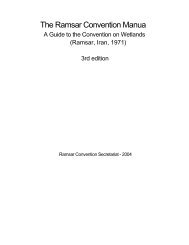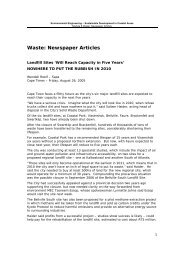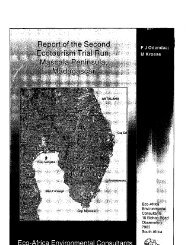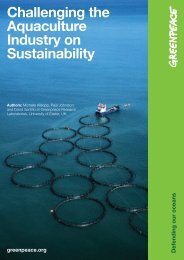Feasibility Study of Proposed Tourism Dev in Shewula, NE ...
Feasibility Study of Proposed Tourism Dev in Shewula, NE ...
Feasibility Study of Proposed Tourism Dev in Shewula, NE ...
You also want an ePaper? Increase the reach of your titles
YUMPU automatically turns print PDFs into web optimized ePapers that Google loves.
Chapter 1 - Introduction<br />
Local participation <strong>in</strong> development projects has been identified as a fundamental<br />
prerequisite for susta<strong>in</strong>ability. If local communities do not take ownership <strong>of</strong> a project<br />
<strong>in</strong> the development stages, it is likely that <strong>in</strong>terest will perish as soon as the<br />
development agency withdraws. It is with this <strong>in</strong> m<strong>in</strong>d that Drake formulates four<br />
levels <strong>of</strong> local participation.<br />
Drake identifies the lowest level as <strong>in</strong>formation shar<strong>in</strong>g, where <strong>in</strong>formation is given to<br />
the community. The next level, consultation, provides the community with the<br />
opportunity to comment on the development. Follow<strong>in</strong>g this, decision-mak<strong>in</strong>g allows<br />
local communities access to decision-mak<strong>in</strong>g with<strong>in</strong> the development process. The<br />
highest level, <strong>in</strong>itiat<strong>in</strong>g action, allows the community to take on the responsibility <strong>of</strong><br />
action and decision mak<strong>in</strong>g. 11<br />
Trends <strong>in</strong> community-based tourism development are show<strong>in</strong>g that the highest form<br />
<strong>of</strong> participation, which Drake refers to as <strong>in</strong>itiat<strong>in</strong>g, contributes most beneficially<br />
towards susta<strong>in</strong>able development.<br />
It is clear from current research that community-based tourism development needs to<br />
be approached <strong>in</strong> a precautionary manner, with role-players hav<strong>in</strong>g open m<strong>in</strong>ds on<br />
how to forge relations and promote open and easy communication between<br />
<strong>in</strong>dividuals. This approach will contribute significantly towards an <strong>in</strong>crease <strong>in</strong><br />
understand<strong>in</strong>g <strong>of</strong> the concept <strong>of</strong> development, and how it should be approached <strong>in</strong><br />
the future.<br />
1.4.1. Terms and def<strong>in</strong>itions<br />
S<strong>in</strong>ce the field <strong>of</strong> community-based tourism development is current and dynamic,<br />
many paradigms are <strong>in</strong> the process <strong>of</strong> be<strong>in</strong>g challenged. This has resulted <strong>in</strong> much<br />
debate over the def<strong>in</strong>ition <strong>of</strong> fundamental terms and concepts. The follow<strong>in</strong>g<br />
def<strong>in</strong>itions are a synthesis, drawn from <strong>in</strong>teraction with practitioners <strong>in</strong> the field and<br />
from current literature.<br />
Ecotourism<br />
'Ecotourism' is a complex term, open to different <strong>in</strong>terpretations and hence difficult to<br />
def<strong>in</strong>e. However, for the purposes <strong>of</strong> this feasibility study ecotourism '...means<br />
susta<strong>in</strong>able tourism development which recognises the <strong>in</strong>terdependence between the<br />
environment and the economy. The aim <strong>of</strong> ecotourism development is to produce net<br />
benefits...while conserv<strong>in</strong>g the environmental and social resource base for future<br />
generations <strong>of</strong> both residents and tourists' 2<br />
Susta<strong>in</strong>able<br />
The mean<strong>in</strong>g <strong>of</strong> the term 'susta<strong>in</strong>able' is much debated. However, it is broadly<br />
accepted that 'susta<strong>in</strong>able' implies '...the wise use <strong>of</strong> natural resources over<br />
generations, and not for the good <strong>of</strong> a s<strong>in</strong>gle lifetime' 3 For the purpose <strong>of</strong> this<br />
report, however, 'susta<strong>in</strong>able' implies the wise use <strong>of</strong> not only 'natural resources', but<br />
all environmental resources, <strong>in</strong>clud<strong>in</strong>g sociological, cultural and f<strong>in</strong>ancial resources.<br />
1<br />
Drake, S. 1991: Nature <strong>Tourism</strong> - Manag<strong>in</strong>g for the Environment, Island Press, Wash<strong>in</strong>gton, DC, p.132.<br />
12<br />
De Vletter, R. n.d: Africa <strong>in</strong> Microcosm : Towards the establishment <strong>of</strong> a transnational ecotourism zone: Swaziland<br />
- Mozambique, p. 10.<br />
13<br />
Yeld, J., op cit.


